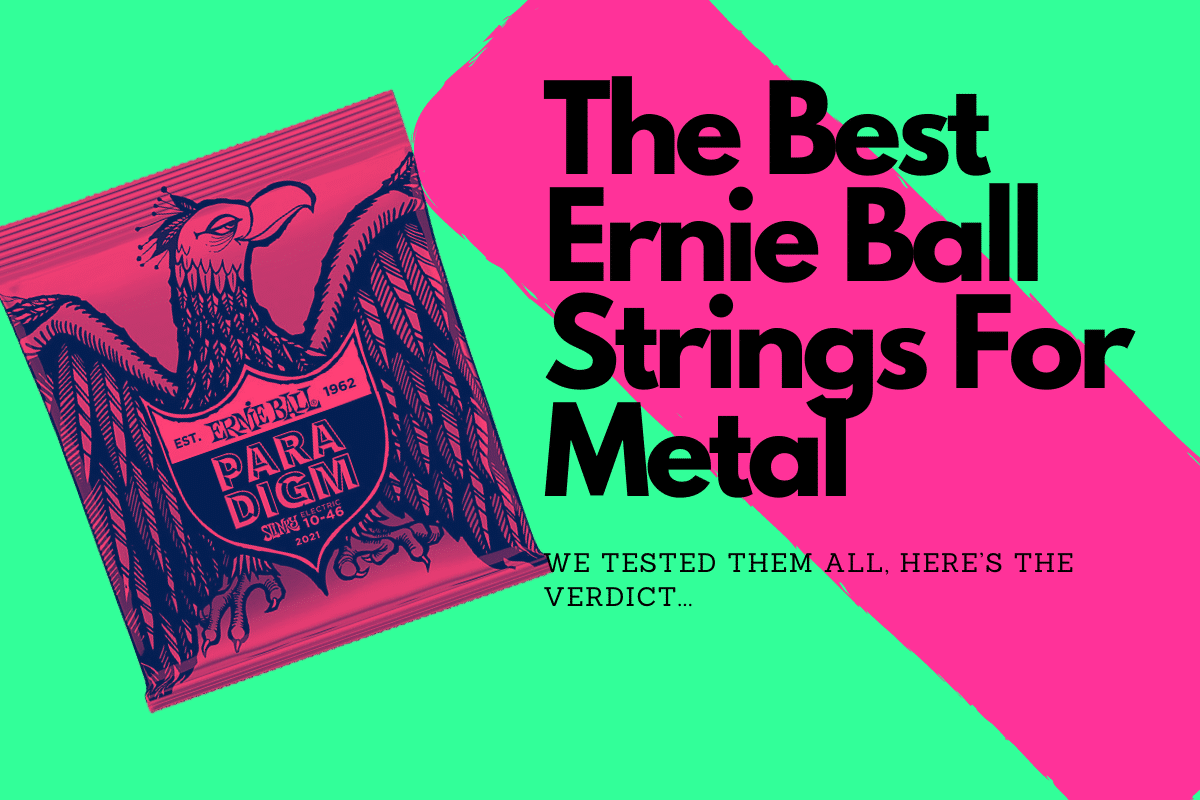ELECTRIKJAM’s #1 Pick Right Now
Ernie Ball Paradigm Strings Are The Best For Metal (And Durability)
They’re a little more expensive than usual, but that’s because they’re damn-near indestructible. They play wonderfully too. I use these strings whenever I play or record – they’re freakin’ awesome.

I road-tested Ernie Ball’s Paradigm strings back when we first stared the site, and ran them – without changing them – for six entire weeks. They kind of blew me away. Normally, I change strings every other week.
— Chris Horton, ELECTRIKJAM
Ernie Ball Paradigm Review
Quality & Feel
★★★★★
Durability
★★★★★
Price
💰💰💰💰
Best For
Metal, Thrash
Overall
★★★★★
What Factors Should You Consider When Choosing Strings For Metal?
When it comes to metal guitar, having the right strings is crucial. You need that thick, heavy sound, solid tuning stability even when riffing hard, and slick playability to shred those lightning solos.
I’ve tested my fair share of string sets to find the best Ernie Ball strings for metal.
As one of the top electric guitar string manufacturers for over 50 years, Ernie Ball sets are played on stages worldwide every night. Their diverse lineup has options tailored specifically for metal guitarists.
But with all those choices – Slinky, Skinny Top Heavy Bottom, Mammoth, Power Slinky, and Paradigm – how do you decide?
Well, I narrowed it down to the top Ernie Ball strings for metal playing based on:
- Gauge and materials
- Tuning stability
- Tone
- Playability
As we already established, my #1 pick right now are Ernie Ball’s Paradigm strings. They’re incredible, insanely durable, and they last ages between changes.
But they are on the pricier side, so if you want some cheaper – but equally very impressive options – read on because we have a bunch of alternatives below.
Best Ernie Ball Strings For Metal

Ernie Ball Regular Slinky (11-14-18p-28-38-48)
The Ernie Ball Slinky sets are hugely popular among rock and metal players, designed for perfect balance of thick tone and easy playability.
For metal, I recommend the Regular Slinky over the Super or other models. The 11-48 gauge still has nice and tight wound construction but just a bit lighter than Super Slinky for solid low-end chunk without losing top-end flexibility needed for leads.
You get great tuning stability even down to D or Drop C tuning along with the signature Slinky evenness along all strings.
The nickel-plated steel maintains brightness and cut. An all-around versatile set great for classic to progressive metal.
Ernie Ball Mammoth Slinky (12-16-24p-32-42-54)
If you want to get truly nasty tones, look no further than Ernie Ball’s fattest metal strings – the Mammoth Slinky set.
With a 12-54 gauge, they can handle seriously low tunings like Drop G# or even F# without losing tension and tone quality. The tight, defined low end pumps out chugging rhythms with authority.
Despite the heavy bottom end, the Mammoth Slinkys still have a balanced tone curve into the mid-range so your riffs maintain clarity even on a fuzzy distorted amp. High notes have enough give for string bending thanks to the top three unwound plain strings.
Just note – for guitars with vintage-style trem systems, this heavier gauge may need a tremolo adjustment.
Ernie Ball Skinny Top Heavy Bottom (10-13-17p-30-42-52)
This unique hybrid set combines light top and heavy bottom strings, living up to its name. The result? Buttery smooth playability up top yet still having a fat sound down low.
And I really do quite like them a lot, check out the pricing details here.
The Skinny Top Heavy Bottoms have become a go-to choice for shredders like Zakk Wylde and John Petrucci. The 10 and 13 gauge plain strings bend like a dream for silky leads and squealing pinch harmonics.
Yet when it’s time to chug, the 30-52 wound strings pump out the bass tones. And the balanced gauge curve keeps the mids strong for complex picking parts. The plain steel maintains brightness while the nickel-plated steel has a warm vintage tone.
Things To Keep In Mind & Other FAQs
Which gauge strings are best for metal?
For metal, 11 or 12 gauge electric guitar strings provide a good balance of heavy, thick tone with still enough flexibility for fast solos and string bends.
Anywhere from 11-48 gauge to 12-54 gauge is ideal for most standard tuned metal or even medium down tunings like Drop D or Drop C.
Are heavier strings better for metal?
In most cases, yes – heavier guitar strings are better suited for the thick distorted tones expected in metal styles like thrash, death metal, djent, etc.
Heavier gauge strings around 11s or 12s can handle aggressive playing and also create tight low end when tuned down without losing power.
Is 10-46 good for metal?
10-46 gauge strings may work for certain modern or melodic metal styles where higher tunings and string bending are frequently used.
However, for most traditional heavy metal genres, 10-46 strings are on the lighter side. 11-48 or thicker are recommended for deeper tuning stability and chunky rhythms.
But ultimately choose what gauge feels and sounds best for your personal playing style.


Leave a Reply